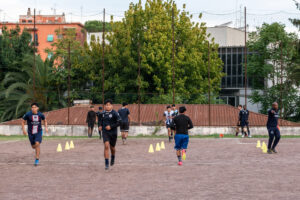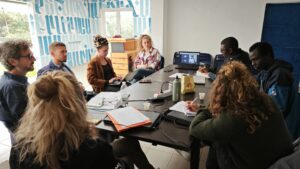[:it]
Da Caserta, passando per le periferie napoletane, fino alle finali nazionali di Cesenatico per portare avanti un importante progetto d’integrazione. Gli RFC Lions, da sei anni, si battono affinché il calcio possa diventare un momento d’incontro ed inclusione.
Buba ha quasi quarant’anni. Come ogni sera, da quando è arrivato in Italia, sta in piedi accanto allo stesso semaforo. Aspetta che qualche automobilista accetti di farsi pulire il vetro in cambio di pochi spiccioli. Di certo, non è il lavoro che sognava di trovare quando è partito dal Senegal. Sempre meglio che spacciare o andare a rubare, deve aver pensato. Tutte cose che, evidentemente, non gli appartengono. Cose che non ha mai fatto e che, anche volendo, non saprebbe proprio fare. Meglio starsene lì allora, solo come un cane, con un spazzolone bagnato di sapone tra le mani.
Marco è un ragazzo di Caserta, uno come tanti. Con la passione per il calcio e per la musica Ska. Quella sera, come capita spesso, sta tornando da una partitella di calcetto con gli amici. Lungo la strada, che dal campetto porta a casa sua, si ferma ad un semaforo. In fila, davanti a lui, c’è una Smart. Affianco, sul ciglio della strada, un ragazzo di colore sulla quarantina con in mano una spazzola per pulire il parabrezza. Attende, impassibile, che qualcuno si fermi per racimolare gli ultimi spiccioli della giornata. Di colpo, l’uomo sulla Smart accelera e sembra volerlo investire.
Da quella sera, Marco e Buba sono diventati grandi amici. Per mesi hanno 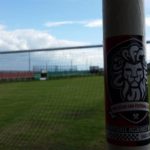 organizzato partite di calcio coinvolgendo la numerosa comunità senegalese che vive nel casertano. Fino a quando non hanno deciso di dar vita ad una squadra mista, italo-senegalese appunto. Gli RFC Lions, che con il tempo sono diventati un progetto enorme. Pronto a sfidare la diffidenza e i pregiudizi, per fare del calcio qualcosa d’inclusivo. Inizia così questa storia: dall’indignazione di chi, stanco di assistere ad episodi d’intolleranza, ha scelto la strada dell’integrazione attraverso ciò conosce meglio: il calcio.
organizzato partite di calcio coinvolgendo la numerosa comunità senegalese che vive nel casertano. Fino a quando non hanno deciso di dar vita ad una squadra mista, italo-senegalese appunto. Gli RFC Lions, che con il tempo sono diventati un progetto enorme. Pronto a sfidare la diffidenza e i pregiudizi, per fare del calcio qualcosa d’inclusivo. Inizia così questa storia: dall’indignazione di chi, stanco di assistere ad episodi d’intolleranza, ha scelto la strada dell’integrazione attraverso ciò conosce meglio: il calcio.
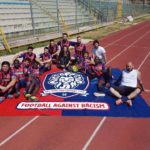 Per realizzare il loro obiettivo, Marco e i suoi amici, hanno pensato di attingere all’immenso panorama di squadre popolari presenti in tutto il territorio campano. Afronapoli, Stella Rossa o Quartograd, sono solo alcune delle realtà che, da anni in agli RFC Lions, si battono come Leoni per portare un barlume di speranza nel grigiore della periferia napoletana. Organizzano tornei di street soccer ed eventi musicali a ritmo di Ska. Diffondono valori come l’antirazzismo e l’antisessismo. (Stra)convinti della possibilità di cambiare le logiche monetarie che si celano dietro a questo sport per renderlo, finalmente, accessibile a tutti. Senza ostacoli, tanto economici quanto burocratici.
Per realizzare il loro obiettivo, Marco e i suoi amici, hanno pensato di attingere all’immenso panorama di squadre popolari presenti in tutto il territorio campano. Afronapoli, Stella Rossa o Quartograd, sono solo alcune delle realtà che, da anni in agli RFC Lions, si battono come Leoni per portare un barlume di speranza nel grigiore della periferia napoletana. Organizzano tornei di street soccer ed eventi musicali a ritmo di Ska. Diffondono valori come l’antirazzismo e l’antisessismo. (Stra)convinti della possibilità di cambiare le logiche monetarie che si celano dietro a questo sport per renderlo, finalmente, accessibile a tutti. Senza ostacoli, tanto economici quanto burocratici.
We want to play è stata, infatti, la prima campagna di sensibilizzazione a cui gli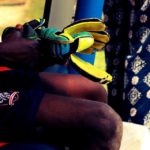 RFC Lions hanno dato vita. Volevano cambiare le regole del gioco. Gridare al mondo intero: che nessuno è illegale per giocare al calcio. Che lo sport non ha niente a che vedere con i permessi di soggiorno o con i tesseramenti della FIGC. La loro passione e il loro impegno sociale gli hanno permesso, in soli sei anni, di formare ben due squadre di calcio. Una amatoriale che, giusto per onor di cronaca, quest’anno si è laureata campione, e l’altra che da 2 anni milita nel campionata di terza categoria.
RFC Lions hanno dato vita. Volevano cambiare le regole del gioco. Gridare al mondo intero: che nessuno è illegale per giocare al calcio. Che lo sport non ha niente a che vedere con i permessi di soggiorno o con i tesseramenti della FIGC. La loro passione e il loro impegno sociale gli hanno permesso, in soli sei anni, di formare ben due squadre di calcio. Una amatoriale che, giusto per onor di cronaca, quest’anno si è laureata campione, e l’altra che da 2 anni milita nel campionata di terza categoria.
Hanno capito prima degli altri, che era necessario rimanere umani. Combattere quel razzismo latente che, come un virus, iniziava a serpeggiare tra le vie e le strade di Caserta nonostante l’attivismo che la città esprime. Quando è nato il loro progetto, gli SPRAR ancora non esistevano. Di sbarchi e di ”emergenza” migranti se ne parlava poco. Di ragazzi in fuga da guerre e povertà, però, ce n’erano già molti. Così, anche grazie all’ARCI, hanno pensato di includerli un percorso sportivo che potesse alleviare le sofferenze patite. Per riportare un po’ di gioia nelle loro vite e, magari, dimenticare anche solo per qualche ora gli orrori a cui hanno assistito.
Con il passare del tempo, però, sempre più migranti e richiedenti asilo hanno preso parte al progetto. Mentre si spargeva la voce, infatti, i ragazzi pieni d’entusiasmo andava in massa ad allenarsi. Così, senza volerlo, gli RFC Lions sono diventati un punto fermo. Un oasi nel deserto, come si dice, per centinaia di loro. Marco e suoi amici non ha mai smesso di combattere al loro fianco. Al prezzo di enormi sacrifici ogni settimana, di sera, raccattavano borse e borsoni e con il furgone hanno iniziato a girare la provincia in lungo e in largo.
Con ogni mezzo possibile e immaginabile, hanno cercato finanziamenti. Autotassazione, t-shirt e concerti fin dall’inizio sono serviti a porre le basi per quello che, oggi, è diventato l’emblema di un progetto d’integrazione che cerca di creare momenti d’incontro, coinvolgendo anche i bambini delle periferie e i ragazzi delle scuole superiori.
Scopro poi, grazie a Marco Proto, che oltre a pub e autoricambi che nel tempo si sono aggiunti alla lista dei sostenitori economici del progetto, ad appoggiare gli RFC Lions c’è anche una fondazione davvero speciale. La Fondazione Mario Diana qui a Caserta, infatti, è per tutti la Fondazione. Quella con la F maiuscola. Nata per rendere onore ad un eroico imprenditore, che si opposto alla Camorra ed ha pogato con la vita la scelta di non chinare la testa di fronte a chi vorrebbe tenere in scacco questa bellissima città.
Sono passati quasi sei anni da quando Marco e Buba si sono incontrati. Da quel giorno, per entrambi sono cambiate molte cose. Buba adesso vive in Francia, ma non perde occasione per chiedere ragguagli sulla squadra. Quel stesso gruppo che, come ci tiene a sottolineare Marco, è diventata una famiglia. Le differenze sono diventate virtù e le divergenze di un tempo si sono trasformati in momenti di crescita. Tutto questo grazie alla dedizione di chi ha scelto l’integrazione alla diffidenza. L’umanità all’odio e al razzismo.
(Mattia Bagnato)
[:en]
From Caserta, passing through the hinterland of Napoli, to the national finals in Cesenatico to take forward an important project of integration. For six years RFC Lions have fought to make football a moment of meeting and inclusiveness.
Buba is almost 40. Like every evening since he arrived in Italy, he’s standing there, waiting for the traffic lights to go red. He’s waiting for some drivers to allow him to clean their window screens in return for some loose change. For sure, it’s not the job he dreamed of when he left Senegal. Still, it’s better than selling drugs or thieving, he must have thought. None of those things, evidently, were in him. Things had had never done, and even if he wanted to, wouldn’t know how. Better stay there then, solitary like a stray dog, with a soap-sodden brush in his hands. Marco is a lad from Caserta, like many others. He has a passion for football and Ska. That evening, as often happens, he’s coming from a game of five-a- side with friends. Along the road, which runs from the pitch to his house, he stops at the lights. In front of him, there’s a Smart. To one side, on the edge of the road there’s a black man of about 40 with a brush in his hand to clean window screens. He waits, impassive, until someone stops to scrape together the last bit of change from the day. Suddenly, the man in the Smart accelerates as if he wants to knock him over.
Since that evening, Marco and Buba has been firm friends. For months, they have organised football matches involving the large Senegalese community that live around Caserta. Until the moment they decided to create a mixed team, Italo-Senegalese: RFC Lions. In time, it has become a huge project. Ready to take on the mistrust and the prejudices, to make of football something inclusive. That’s how the story began: from the indignation of someone who, tired of witnessing scenes of intolerance, chose the route of integration through that which he knows best: football.
involving the large Senegalese community that live around Caserta. Until the moment they decided to create a mixed team, Italo-Senegalese: RFC Lions. In time, it has become a huge project. Ready to take on the mistrust and the prejudices, to make of football something inclusive. That’s how the story began: from the indignation of someone who, tired of witnessing scenes of intolerance, chose the route of integration through that which he knows best: football.
 To achieve their objective, Marco and his friends thought of drawing upon the immense panorama of local teams present throughout the region of Campania. Afronapoli, Stella Rossa or Quartograd are just a few of the teams that for years have fought like Lions to bring a glimmer of hope to the greyness of the outskirts of Naples. They organise street soccer tournaments and music events to the rhythm of Ska. They spread values such as anti-racism and anti-sexism. Convinced of the possibility of changing the monetary logic which hides behind this sport to render it, finally, accessible to everyone. Without barriers, either financial or bureaucratic.
To achieve their objective, Marco and his friends thought of drawing upon the immense panorama of local teams present throughout the region of Campania. Afronapoli, Stella Rossa or Quartograd are just a few of the teams that for years have fought like Lions to bring a glimmer of hope to the greyness of the outskirts of Naples. They organise street soccer tournaments and music events to the rhythm of Ska. They spread values such as anti-racism and anti-sexism. Convinced of the possibility of changing the monetary logic which hides behind this sport to render it, finally, accessible to everyone. Without barriers, either financial or bureaucratic.
We want to play was, in fact, the first campaign of awareness to which RFC Lions gave life. They wanted to change the rules of the game. To shout to the entire world: that nobody is illegal to play football. That sport has nothing to do with residence permits or membership cards for the FIGC. Their passion and their social commitment has allowed them, in just six years, to form not one, but two football teams. One amateur team, which, just for the record this year won the league, and another which for two years has played in the Third Category.
the rules of the game. To shout to the entire world: that nobody is illegal to play football. That sport has nothing to do with residence permits or membership cards for the FIGC. Their passion and their social commitment has allowed them, in just six years, to form not one, but two football teams. One amateur team, which, just for the record this year won the league, and another which for two years has played in the Third Category.
They had realised before the others that it was necessary to remain human. To fight that latent racism which, like a virus, had started to wind through the streets of Caserta despite the activism expressed by the city. When their project was born, the SPRAR (Protection System for Refugees and Asylum Seekers) still did not exist. Little was spoken about landings and the emergency of migrants. But there were many young people escaping war and poverty. So, thanks also to the ARCI (Associazione Ricreativa e Culturale Italiana), they thought of including them in a sporting journey that could help alleviate some of their suffering. To put a bit of joy back in their lives and
maybe help them forget just for a few hours they horrors they had witnessed.
With the passing of time, however, more and more migrants and asylum seekers took part in the project. But the word was passed around by lads full of enthusiasm who would go en masse to training. In this way, without even intending to, RFC Lions became a fixed reference point. An oasis in the desert, as the saying goes, for hundreds of those lads. Marco and his friends have never stopped fighting by their side. At the cost of a huge sacrifice every week, each night, they used to collect bags and holdalls and with their van would go around all corners of the province.
With every means possible and imaginable they sought funding. Self-imposed taxes, T-shirts, and concerts served from the outset to lay the foundations of that which, today, has become a symbol of a project of integration which tries to create moments of encounter, involving even small children from the suburbs and kids from the upper schools.
I then discover, thanks to Marco Proto, that as well as pubs and auto parts dealers that over time have joined the list of economic supporters of the project, there is a special foundation which also lends its backing to RFC Lions. The Mario Diana Foundation here in Caserta is, for everyone, ‘the Foundation’. With a capital F. Created in honour of a heroic local businessman who opposed the Camorra and who paid with his life for the decision to not bow down before those who want to hold this beautiful city to ransom.
Almost six years have passed since Marco and Buba met. Since that day, many things have changed for both. Buba now lives in France, but he never misses the chance to ask about for the latest news about the team. That same group, which, as Marco stresses, has become a family. Difference has become a virtue and the differences of once upon a time have been transformed into moments of growth. All this thanks to the dedication of those who have chosen integration over mistrust, humanity over hatred and racism.
(Mattia Bagnato)[:]

